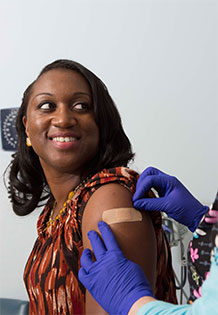Vaccines and Immunization
You can help protect yourself and others against seasonal flu and other vaccine-preventable diseases by getting immunized.

Vaccines are some of the safest medical products. But, like any other medical product, there may be risks. Talk to your health care provider about the value of vaccines and their side effects.
Vaccines to consider
Influenza (flu): People who are 6 months and older should get the flu vaccine (flu shot). Get the vaccine each year because flu virus can change from one year to the next.
Pneumococcal: Older people and those with certain medical conditions are most susceptible to pneumonia. People under 65 will need a booster shot when they reach 65 if more than five years have passed since the initial dose. Learn about pneumococcal pneumonia and vaccines.
Hepatitis A: Recommended for those who travel to other countries or live in a U.S. community with high rates of hepatitis A; or who have chronic liver disease, engage in male-to-male sex, or inject drugs. Learn more about the hepatitis A vaccine.
Hepatitis B: More contagious than HIV, hepatitis B is the type of hepatitis most often spread through sexual contact. It can also be passed from an infected mother to newborn, the sharing of needles or personal items with an infected person, and other contact involving bodily fluids. The hepatitis B vaccine can prevent the disease.
Measles, mumps, rubella (MMR): People born after 1956 and all women of childbearing age who have not had these diseases or been vaccinated against them need to get the shots to be protected.
Chickenpox (varicella): Protection is necessary for those born in the U.S. after 1966 and have not had this disease and have not been vaccinated. Adults are at a far greater risk of complications.
Shingles (herpes zoster): Shingles is a painful, rash-like illness. If you are 50 or older, get Shingrix which provides strong protection from shingles and long-term nerve pain. Even if you’ve had Shingles, it’s important to receive the vaccine because you can get the disease more than once. You may have already got a different shingles vaccine called Zostavax. If you did, you still need 2 doses of Shingrix. Your risk of shingles and complications increases as you age. You need 2 doses of Shingrix. Get the second dose 2 to 6 months after you get the first dose. For more information, see Shingles Vaccine Fact Sheet for Adults.
Tetanus, diphtheria, pertussis: Booster doses of tetanus-diptheria (Td) are needed at 10-year intervals. In place of the Td booster, people age 19-64 and those 65 and older who are in contact with infants should get a one-time dose of tetanus-diptheria-pertussis (Tdap) to also protect against whooping cough.
Vaccines for international travelers: Many Veterans and other Americans traveling abroad are likely to be exposed to diseases common in those countries.
To learn more, visit VA's National Center for Health Promotion and Disease Prevention page on recommended vaccines and screening tests, or go to Vaccines.gov.




















